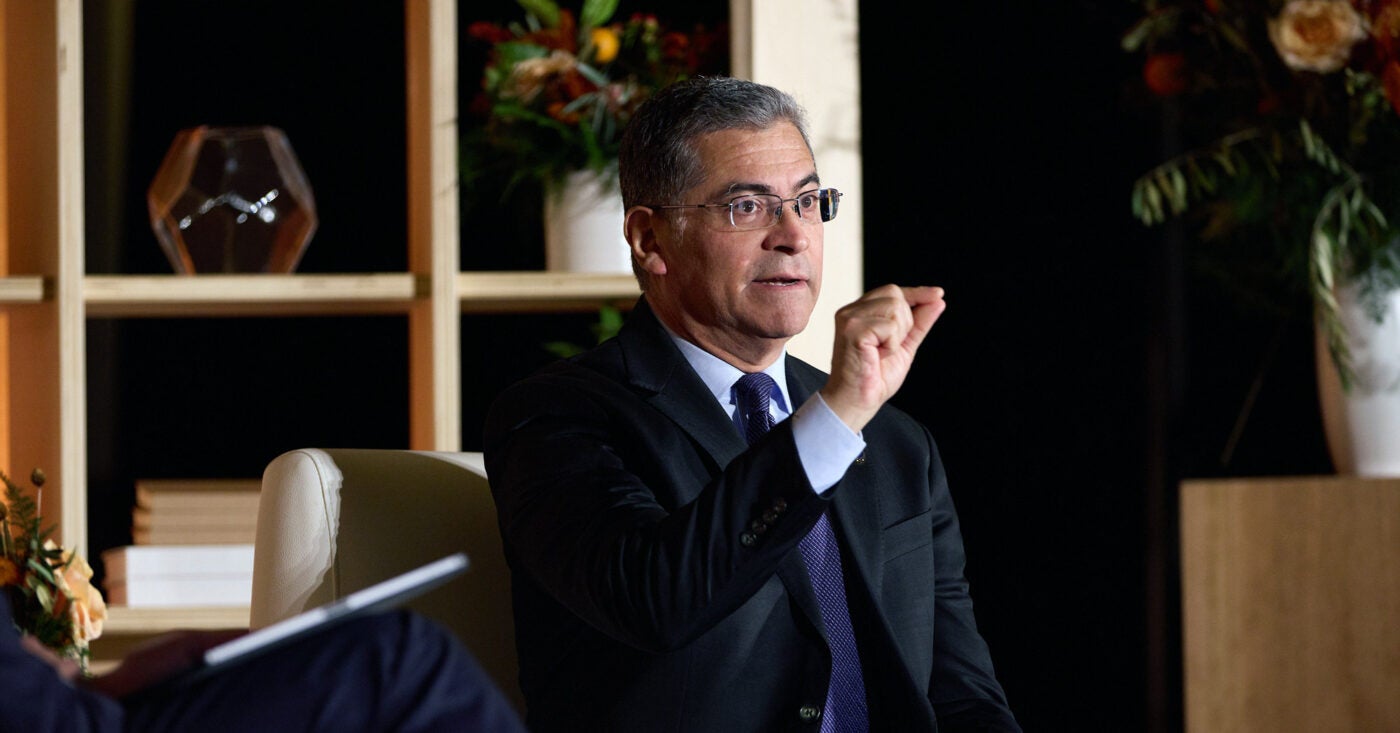
From the editor
Becerra on the Alabama IVF decision, Supreme Court mifepristone case, and more
Secretary of Health and Human Services Xavier Becerra spoke about a range of topics, from drug prices to health coverage, during the WSJ Health Forum in Boston last Thursday. Becerra was often refreshingly direct in his responses to Patrick McGroarty, the Wall Street Journal’s health and medicine bureau chief—for example, in his answer to McGroarty’s first question, about the Alabama Supreme Court’s decision to grant frozen embryos status as children: “It’s hard to understand. I would use the word ‘absurd,’ but my counsel would probably tell me not to.”
Sign up for Harvard Public Health
Delivered to your inbox weekly.
Becerra has his eye on the courts
He was circumspect about the U.S. Supreme Court’s potential decision in Food and Drug Administration v. Alliance for Hippocratic Medicine, the case challenging whether the FDA had erred in approving mifepristone. He made the obvious reminder that “the case is about more than mifepristone.” Noting that the approval process for it has been used for decades, Becerra said, “if it by some chance is found to be a process that is flawed, it’s not just mifepristone that is impacted. Each and every one of us in this room can count any number of … medications that now become subject to challenge.”
He also noted that the Alabama Supreme Court’s ruling on embryos could have far-reaching implications and used the example of whether a woman could take her embryos with her if she moved out of the state; would the embryos still be subject to Alabama law?
Becerra had plenty to say about money
McGroarty asked if Becerra was surprised by lawsuits filed against his agency over its push for lower drug pricing. “Surprised that the pharmaceutical companies are suing us? No,” Becerra said, to laughs from the audience. “Surprised that they’re engaged in negotiations? Pleasantly surprised, and happy that while they’re suing us on one hand, they are also engaged in negotiations on the other.” He compared the process to buying a car, saying no one pays sticker price for a car, and the government should make sure it isn’t paying sticker price for prescription medication.
He also said money was the federal government’s primary tool for working within the U.S.’s “patchwork” public health system. “We don’t have a national system of public health. We have a nationwide system of public health,” Becerra said, noting that each state has its own approach to public health. The lack of a national system helped exacerbate COVID-19’s impact, lowering life expectancy rates in the U.S., he said. Money, in the form of programs like Medicare, Medicaid, and the Affordable Care Act, is how the government lures states “to do what they should” for public health.
He gave the example of the 988 Suicide & Crisis Lifeline, which was signed into law by President Trump in October 2020 but not given much funding prior to its rollout in July 2022. Becerra said Biden Administration funding of roughly $1.2 billion has helped states implement and support the new number—and drive a massive increase in usage.
And yes, Becerra wants you to get a COVID booster
Becerra was clearly frustrated that more people have received a flu shot than the most recent COVID booster, which is free. He said he doesn’t understand the numbers, since COVID is still about six times more deadly than the flu.
Other notes from the forum:
- A Philips executive called health equity “a moral imperative”—just days after ProPublica and the Pittsburgh Post-Gazette reported the company had lied to consumers, telling them it was safe to keep using CPAP machines that had been recalled.
- Hackers are wreaking havoc with health care generally: In the U.S., the health care industry experienced an average of two attacks a day in 2023, and the summit took place the same day that United Healthcare’s Change Healthcare unit acknowledged an outage caused by a cyber attack. Stephen Gillett, CEO of Verily (formerly Google Life Sciences), called the onslaught an effort by organized crime and and nation-states “to monetize and create destructive value.”
- CRISPR gene-editing therapy is full of potential, but will it stop the aging process? “No,” said Jeffrey Leiden, Vertex’s executive chairman. He joked that it won’t bring his hair back, either.
- Meta is being sued by more than 40 state attorneys general alleging it deliberately makes its social media products addictive, contributing to a youth mental health crisis. Is TikTok next? Conversations between the company and AGs are “active,” said Andrea Joy Campbell, Massachusetts attorney general, one of the AGs who has filed suit against Meta.
Due to a reporting error, Stephen Gillett’s title was incorrect. He is CEO of Verily.
Top image: Wister Hitt / Dow Jones



